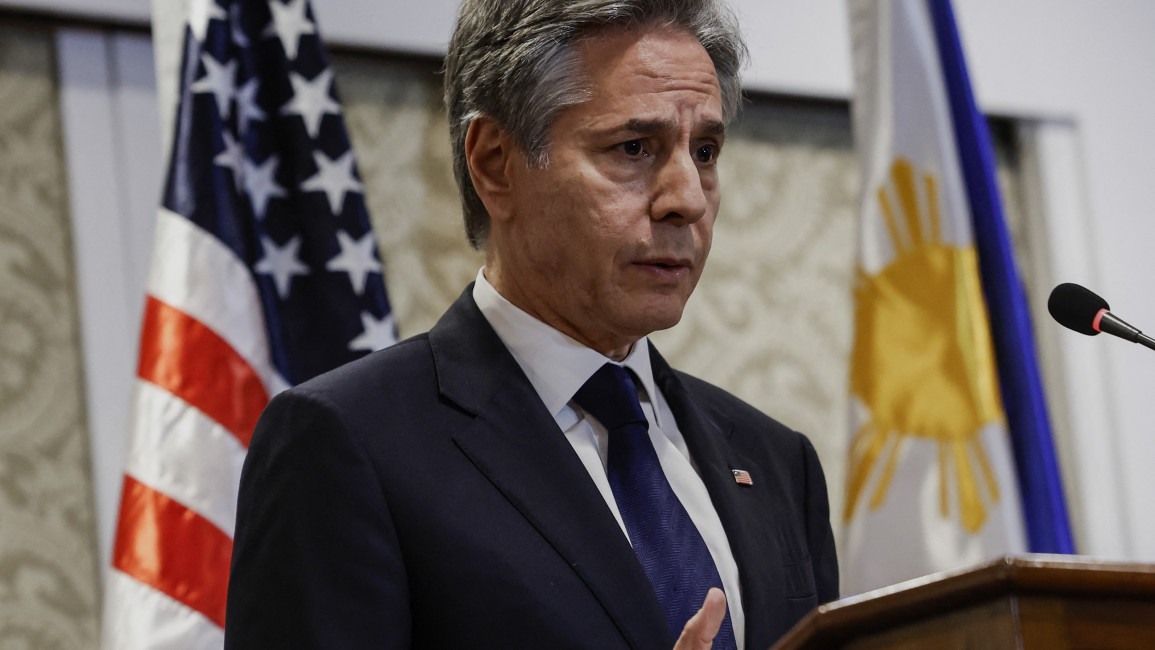NGOs slam US support for Israel as Blinken admits 'acute food insecurity' in Gaza
Aid groups have slammed US Secretary of State Antony Blinken's admission that 100 percent of the Gaza population is facing "acute food insecurity" as too little too late, following months of ignored warnings.
"According to the most respected measure of these things, 100 percent of the population in Gaza is at severe levels of acute food insecurity. That's the first time an entire population has been so classified," Blinken told reporters on Tuesday during a press conference in the Philippines where he has been on an official visit.
The World Food Programme (WFP) defines acute food insecurity as when a person's inability to consume adequate food puts their lives in immediate danger.
Blinken's remarks have been criticised by humanitarian organisations who have warned for months that unless hostilities cease, more of Gaza's 2.3 million population will continue to die in what officials have described as a 'man-made disaster'.
Refugees International, an independent humanitarian advocacy organisation, said that it holds US President Joe Biden responsible.
"The United States continues to back Israel’s military offensive and supply military assistance that Israel has used to violate international law," Refugees International said in a statement on Monday.
"Moreover, the United States has repeatedly blocked and watered-down timely UN Security Council action to halt the conflict and address obstruction of humanitarian action."
Blinken has led talks on behalf of Washington across the region since the start of the war and is due to land in Saudi Arabia and Egypt this week.
But critics have said that the US, Israel's closest ally, has failed to pressure Israeli Prime Minister Benjamin Netanyahu to ensure better access for aid, including opening land crossings into the north of the strip.
28-year-old Inas is one of countless Palestinian women in Gaza who've been detained by Israeli forces since Oct 7. Speaking to @abeerayyoub, she says she was subjected to verbal, physical, and psychological abuse by Israeli soldiers.
— The New Arab (@The_NewArab) March 19, 2024
This is her story👉 https://t.co/CF7ixvnuza pic.twitter.com/y1md20rJoh
On Monday, the Integrated Food Security Phase Classification (IPC), a UN-backed food assessment report, said that "all evidence points towards a major acceleration of deaths and malnutrition" in Gaza.
The IPC’s report said that 1.1 million people, around half of Gaza’s population, were facing catastrophic conditions.
It predicts that famine is "imminent in the northern governorates and projected to occur anytime between mid-March and May 2024".
The World Food Programme said this was "highest number of people ever recorded as facing catastrophic hunger" under the IPC system.
UN human rights chief Volker Turk said on Tuesday that the predicted imminent famine "can and must be protected".
ICP's December report warned that unless aid supplies increased, and hostilities reduced hunger and malnutrition would be rife across the territory by February.
At least 27 people, including 23 children, have died from malnutrition and dehydration in north Gaza over the past few weeks, the health ministry there has said.
Amid the repeated warnings from aid agencies, the international community, including the US, Jordan, and the UK, have resorted to delivering aid using airdrops and opening a maritime corridor for ships – both methods have been criticised by aid groups as costly and inefficient.
"Only a massive scale-up of unfettered humanitarian assistance through the UN and NGOs (including UNRWA), and restoration of cross-border commercial trade, can reverse the current trajectory," Refugees International said.
UK-registered NGO Action For Humanity, which has operated in Gaza since 2021, called on the UK government to immediately intervene to prevent further suffering in Gaza.
"Up until now, the UK Government has stalled, undermining their commitments to human rights and international law," the charity said in a statement in response to the IPC report.
Action For Humanity-International director Othman Moqbel said: "The only viable option to fending off the famine is through the land border."
"No other method for delivery, through land or sea, can match the sheer scale of need in Gaza."
Meanwhile, Israel on Monday issued a staunch rebuttal to South Africa's request to the International Court of Justice (ICJ) at The Hague that further measures be imposed on Israel to address the looming famine.
Lawyers for Israel have denied the allegations made by South Africa in December that Israel is deliberately causing humanitarian suffering in Gaza.
In a statement made public on Monday, Israel brushed off South Africa's submissions for intervention from the court as "shrill and repeated".
"The accusations made therein are outrageous and categorically denied,” the statement read, adding that they are "wholly unfounded in fact and law, morally repugnant, and represent an abuse both of the Genocide Convention and of the Court itself".
Pretoria has asked the court to intervene three times since its preliminary ruling in January, which ordered Israel to take all measures to prevent acts which could fall under the Genocide Convention in its Gaza offensive.



